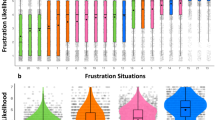Abstract
Frustration negatively affects user experience both in manual and automated driving and negatively influences driving performance and system acceptance. Hence, frustration-aware in-vehicle systems that assess the drivers’ current level of frustration and help to mitigate it have gained attention. However, while there has been ample of research on the assessment of the user’s affective state in the vehicle, little progress has been made on the mitigation of these affective states. Thus, little is known about interaction strategies for automotive user interfaces that successfully mitigate the user’s frustration in frustrating situations. To bridge this gap, the aim of this study was the investigation of potential frustration regulation strategies as basis for supporting frustrated vehicle users in frustration-aware systems based on user needs. We conducted focus groups with users of different age groups (below and above 65 years) to explore which different emotion regulation strategies might work for different age groups in a user-centered way. Two representative use cases of today’s and future driving were chosen, one for manual and one for automated driving, respectively. Only slight differences for the suggested emotion regulation strategies were observed between the age groups with respect to their rated helpfulness. The results provide a helpful basis to develop future in-vehicle frustration mitigation systems in terms of intelligent automotive user interfaces.
Access this chapter
Tax calculation will be finalised at checkout
Purchases are for personal use only
Similar content being viewed by others
References
Lazarus, R.S.: Progress on a cognitive-motivational-relational theory of emotion. Am. Psychol. 46, 819–834 (1991). https://doi.org/10.1037/0003-066X.46.8.819
Bosch, E., Ihme, K., Drewitz, U., Jipp, M., Oehl, M.: Why drivers are frustrated: results from a diary study and focus groups. Eur. Transp. Res. Rev. 12(1), 1–13 (2020). https://doi.org/10.1186/s12544-020-00441-7
Zepf, S., Dittrich, M., Hernandez, J., Schmitt, A.: Towards empathetic car interfaces. In: Proceedings of the CHI 2019: CHI Conference on Human Factors in Computing Systems, pp. 1–6 (2019). https://doi.org/10.1145/3290607.3312883
Lee, Y.C.: Measuring drivers’ frustration in a driving simulator. In: Proceedings of the Human Factors and Ergonomics Society Annual Meeting, vol. 54, pp. 1531–1535 (2010). https://doi.org/10.1177/154193121005401937
Löcken, A., Ihme, K., Unni, A.: Towards designing affect-aware systems for mitigating the effects of in-vehicle frustration. In: Proceedings of the 9th International Conference on Automotive User Interfaces and Interactive Vehicular Applications Adjunct, pp. 88–93. ACM, New York (2017). https://doi.org/10.1145/3131726.3131744
Oehl, M., Ihme, K., Drewitz, U., Pape, A.A., Cornelsen, S., Schramm, M.: Towards a frustration-aware assistant for increased in-vehicle UX. In: Proceedings of the 11th International Conference on Automotive User Interfaces and Interactive Vehicular Applications: Adjunct Proceedings, pp. 260–264. ACM, New York (2019). https://doi.org/10.1145/3349263.3351518
Bosch, E., et al.: Emotional GaRage: a workshop on in-car emotion recognition and regulation. In: Adjunct Proceedings of the 10th International ACM Conference on Automotive User Interfaces 2018 – AutomotiveUI 2018 Adjunct, pp. 44–49. ACM, New York (2018). https://doi.org/10.1145/3239092.3239098
Franz, O., Drewitz, U., Ihme, K.: Facing driver frustration: towards real-time in-vehicle frustration estimation based on video streams of the face. In: Stephanidis, C., Antona, M. (eds.) HCII 2020. CCIS, vol. 1226, pp. 349–356. Springer, Cham (2020). https://doi.org/10.1007/978-3-030-50732-9_46
Zepf, S., Stracke, T., Schmitt, A., van de Camp, F., Beyerer, J.: Towards real-time detection and mitigation of driver frustration using SVM. In: Proceedings of the 18th IEEE International Conference on Machine Learning and Applications – ICMLA, pp. 202–209 (2019). https://doi.org/10.1109/ICMLA.2019.00039
Gross, J.J.: Emotion regulation: current status and future prospects. Psychol. Inq. 26, 1–26 (2015). https://doi.org/10.1080/1047840X.2014.940781
Harris, H., Nass, C.: Emotion regulation for frustrating driving contexts. In: Proceedings of the SIGCHI Conference on Human Factors in Computing Systems, p. 749 (2011). https://doi.org/10.1145/1978942.1979050
Franke, T., Attig, C., Wessel, D.: A personal resource for technology interaction: development and validation of the affinity for technology interaction (ATI) scale. Int. J. Hum.-Comput. Interact. 35, 456–467 (2018)
SAE International: Taxonomy and Definitions for Terms Related to On-Road Motor Vehicle Automated Driving System, J3016 (2014)
Large, D.R., Burnett, G., Clark, L.: Lessons from Oz: design guidelines for automotive conversational user interfaces. In: Proceedings of the 11th International Conference on Automotive User Interfaces and Interactive Vehicular Applications: Adjunct Proceedings. AutomotiveUI 2019, pp. 335–340. Association for Computing Machinery, New York (2019). https://doi.org/10.1145/3349263.3351314
Oehl, M., Ihme, K., Bosch, E., Pape, A.A., Vukelić, M., Braun, M.: Emotions in the age of automated driving: developing use cases for empathic cars. In: Proceedings of ACM Mensch und Computer conference (Mensch und Computer 2019), 2 p. ACM, New York (2019). https://doi.org/10.18420/muc2019-ws-267
Author information
Authors and Affiliations
Corresponding author
Editor information
Editors and Affiliations
Rights and permissions
Copyright information
© 2021 Springer Nature Switzerland AG
About this paper
Cite this paper
Oehl, M., Lienhop, M., Ihme, K. (2021). Mitigating Frustration in the Car: Which Emotion Regulation Strategies Might Work for Different Age Groups?. In: Stephanidis, C., Antona, M., Ntoa, S. (eds) HCI International 2021 - Posters. HCII 2021. Communications in Computer and Information Science, vol 1421. Springer, Cham. https://doi.org/10.1007/978-3-030-78645-8_34
Download citation
DOI: https://doi.org/10.1007/978-3-030-78645-8_34
Published:
Publisher Name: Springer, Cham
Print ISBN: 978-3-030-78644-1
Online ISBN: 978-3-030-78645-8
eBook Packages: Computer ScienceComputer Science (R0)




